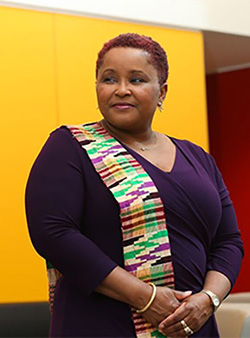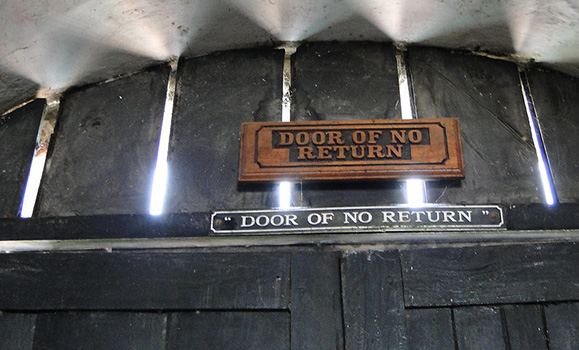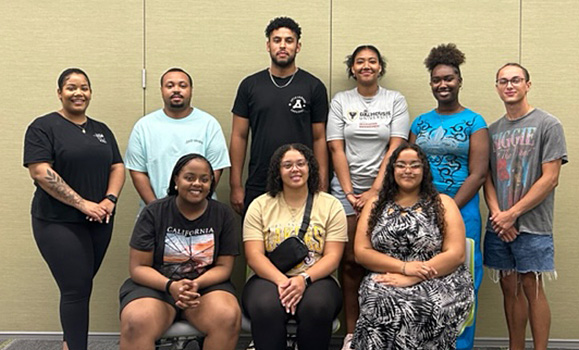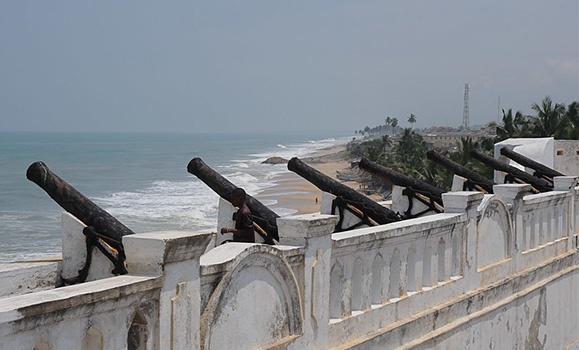During a visit to what is popularly known as Ghana‚Äôs Cape Coast Castle in 2009, then-U.S. President Barack Obama characterized it as a "portal through which the diaspora began." It‚Äôs one of dozens of locations in the country that were once used to imprison Africans before they were sold as part of the trans-Atlantic slave trade.¬Ý
Those individuals who were ripped from their homes and sent overseas in bondage often ended up in far-flung places around the globe, never to return. Many Canadians of African descent today can count some of these people as their distant ancestors.
On his trip, Obama referenced the site as evidence of the capacity of humans to commit evil. However, he also spoke of it as a reminder of the extraordinary progress made because of the courage of many to eventually abolish slavery and win civil rights.¬Ý
"It reminds us that as bad as history can be, it's also possible to overcome," he said.
A group of 11 African Nova Scotian students from Dal will be visiting the Cape Coast site in Ghana this month as part of a two-week study abroad opportunity facilitated by Dr. Barb Hamilton-Hinch, a faculty member and assistant vice-provost equity and inclusion at Dal.
 The group arrives in Ghana in early August, just days after Emancipation Day on Aug. 1 — the day in 1834 when the Slavery Abolition Act came into legislative effect throughout the British empire, including Canada, marking the legal end of centuries of enslavement of African people and their descendants.
The group arrives in Ghana in early August, just days after Emancipation Day on Aug. 1 — the day in 1834 when the Slavery Abolition Act came into legislative effect throughout the British empire, including Canada, marking the legal end of centuries of enslavement of African people and their descendants.
Dr. Hamilton-Hinch, who uses the term "dungeon" rather than "castle" to describe the Cape Coast site and others like it, will take the students on what she calls the "Tour of Return" as part of their stay in the country. They'll go and see ‚ÄúThe Door of No Return,‚Äù which was the last door their ancestors looked out of before being shipped off into slavery. After walking through, they‚Äôll turn around and pass back through what is now labelled as ‚ÄúThe Door of Return.‚Äù¬Ý
‚ÄúGhana has done an amazing job of welcoming people from the African diaspora back home to say, ‚ÄòThis is what your ancestors have gone through, that is the door they went out of, and now you have come back,‚Äù explains Dr. Hamilton-Hinch, seen above right.¬Ý
Dr. Hamilton-Hinch, who has been to Ghana and other African countries many times over the past two decades, says it‚Äôs a powerful experience she can‚Äôt prepare the students for, but rather something they will all experience in their own way.¬Ý

The 'Door of No Return.' (Adam Jones photo/Flickr)
Growing and connecting
The students will also be attending the conference while in Ghana. The conference, organized by the , brings youth from 30 countries in the African diaspora together for a week of learning, leadership development and networking. Delegates participate in a mini-United Nations simulation as part of the conference, helping draft resolutions and recommendations about topics related to education, health, environment, peace and security, and governance and leadership.

The Ghana trip student delegation. Back row, left to right: Alex Randolph, Tristan Thomas, Nathan Barton, Candace Hart, Amariah Bernard Washington, Ty Martin. Front row, left to right: Aisha Smith, Kaisen MacKinnon, Sierra Jordan. Not pictured: Joylyn Colley-Slawter and Lazshell Martin.
‚ÄúI‚Äôm excited to go on a trip with a group of students who all have a shared experience being African Nova Scotian,‚Äù says Nathan Barton, a fourth-year microbiology and immunology student and a student representative on the African Nova Scotian Strategy at ª∆…´÷±≤•.¬Ý
He says he‚Äôs also excited to meet other youth from around the diaspora at the conference and learning from them as part of the mini-UN, while building on his communications and leadership skills.¬Ý
Second-year psychology student Sierra Jordan says it is sure to be a ‚Äúunique‚Äù learning opportunity.¬Ý
¬Ý‚ÄúI‚Äôm looking forward to everything about it really. I love learning so I think it will be a great opportunity to learn from the perspectives of people who live very different lives from me,‚Äù she says. ‚ÄúBeing able to expand my awareness through that learning as well as the learning to be done when we visit the dungeons and places like that is exciting.‚Äù
For Ty Martin, a second-year medical sciences student who identifies as bi-racial, the study abroad course offers a chance to explore his African Nova Scotian heritage more closely.
‚ÄúI think it‚Äôll be a very empowering experience to go visit the land where my ancestors came from and have a deeper and more profound connection with my Black heritage,‚Äù he says.¬Ý¬Ý
Global skills¬Ý
The group of students has been meeting together and completing assignments over the past couple of months as part of the three-credit course. The study abroad opportunity is part of a new Dal program launched last year and funded through federal Global Skills Opportunity grants. It was designed to offer African Nova Scotian and Indigenous students study abroad opportunities aimed at shifting their perspectives on what it means to be of African or Indigenous descent.
A pilot trip to Zambia last year was followed by a trip to several historically Black colleges and universities in the United States earlier this year. Indigenous students travelled to New Zealand this past May to meet members of the Maori community for their first course.¬Ý
Video:
Dr. Hamilton-Hinch and the students will be joined on the trip by seven other Black/African Nova Scotians from various sectors, who will attend a conference of their own while in Ghana and serve as mentors and supporters for the students.¬Ý
Dr. Hamilton-Hinch says online meetings have been useful in helping the group going to Ghana get to know each other and develop a sense of community before travelling together.¬Ý
“They have been supporting each other for several months and have developed that small sense of family that I hope continues,” she says. “I know it’s going to be even stronger when we are in Ghana and when we return. To be able to touch the soil of Mother Africa, walk where your ancestors walked, as an African Nova Scotian is life changing".

